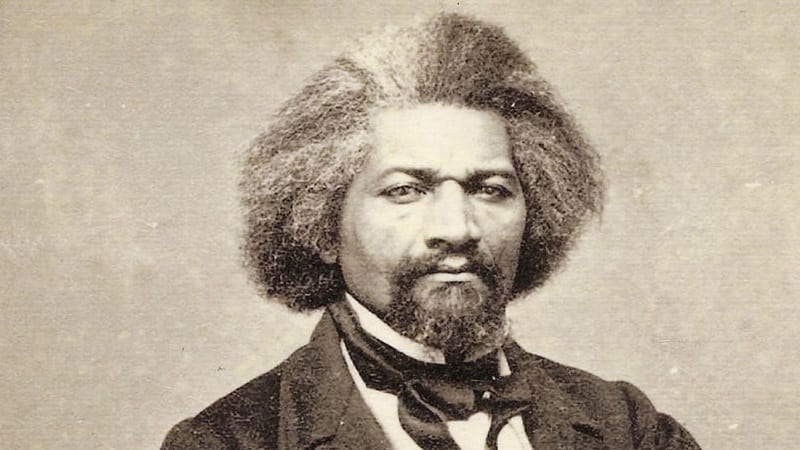Narrative of the Life of Frederick Douglass, an American Slave: Chapters 6 and 10 - Summary
Chapter 6
Douglass is transferred from the country to Baltimore to a new
mistress Mrs. Auld, who is benevolent as he has never known a white person to
be. She is upset when he approaches her with servile self-debasement, and
instead desired slaves to be at ease in her presence. However this soon
changes, because owning slaves corrupts people.
Mrs. Auld begins teaching him to read and write but when Mr Auld
finds out he puts a stop to it because it is illegal and unsafe because it
renders slaves unhappy and unmanageable. This is a revelation to Frederick, as
he understands that the power to enslave lies in keeping the slaves uninformed.
This opposition of Mr. Auld's causes Frederick to resolve to learn to read.
Frederick observes that a city slave is has more privileges than a
country slave. There is a sense of shame in the city that checks cruel
behaviors, as cruel treatment it is badly looked-upon. One exception is his neighbor
Mrs. Hamilton who whips her two slaves frequently and almost to death, and
hardly feed her.
Chapter 10
Douglass is transferred to Mr. Covey to be a field hand on his
plantation. During his first week, he is commanded to drive oxen into the wood
to get a load of wood, but wrecks the gate to the farm in the process, barely
avoiding death. Mr. Covey cuts switches of a gum tree, strips him naked and
whips him. He is whipped almost every times for similar offences, or for being
"awkward". The slaves were fed well enough, but were worked
"fully to the point of endurance". Never did Frederick suffer more
than in the first six months of being Mr. Covey's slave. He came to Mr. Covey
somewhat unmanageable but the latter managed to break Frederick's body and spirit.
Sometimes he debated taking his and Mr. Covey's life but hope and fear
prevented him from doing so.
Mr. Covey was a working man himself so he could not be deceived by
slaves claiming fatigue. To ensure they worked constantly, he would spy and
sneak up on them, never allowing the slaves to feel safe and relax. All his
learning he geared towards deception, so much so that he tricked himself and
others into believing that he was a pious man.
Mr. Covey started as a poor man. He bought a single female slave,
Caroline, and used her as a "breeder". He hired a slave for a year
and made them sleep together until Caroline gave birth to twins.
He sees sails of ships in Chesapeake Bay and begin an apostrophe to
them and their freedom, dreaming of his own freedom, but reconciling himself to
his fate as a slave.
Douglass describes the day when he became a man, the day when his
stay at Mr. Covey's became less intolerable. He was fanning wheat, a task that
is new to him, and his strength failed him. Mr. Covey beat him and try as he
might Douglass could not recover. Douglass, weak and bloodied, goes the seven
miles to his master, Master Thomas, and entreats him to protect him. His master
doubts that Mr. Covey would kill him and sends Douglass back the next morning.
Douglass hides from Mr. Covey the whole day to avoid a beating. He comes across
Sandy, a slave who has a free wife. Sandy advises Douglass to hold a root,
which would prevent any white man from whipping Douglass. Indeed, when Douglass
returns, Mr. Covey greets him and does not beat him. The next day, when Mr.
Covey tries to assault Douglass he fights back. After two hours, Mr. Covey surrenders
to Douglass and for the next six months of Douglass's stay with Mr. Covey he
never beats him again.
This battle with Mr. Covey is the turning point in Douglass's slave
career, and gave him new hope for freedom. He remains a slave for four years afterwards,
and has fights but is never whipped. Douglass conjectures that the reason for
Mr. Covey's not turning him over to the constable for a whipping is to preserve
his reputation as a "first-rate overseer and negro breaker".
Slaves are given the six days between Christmas and New Year's to
do as they please. Some work, creating brooms or hunting for food, but the
large majority drank and was frivolous. Douglass thinks that the slaves allow
this vacation in order to let off necessary steam, for without this yearly
freedom slaves would be sure to rebel, for complete lack of it. In fact,
drinking excessively was encouraged, because this was a way of fooling the
slaves to think that drinking was all there is to freedom, and by the time it
came to work again in the fields the slaves would be almost glad to be back in
the fields.
Douglass leaves Mr. Covey to live with Mr. Freeland. He is more
humane and just than Mr. Covey. He did not pretend to be religious. Douglass
has found that the most religious slaveholders are also the cruelest.
Outstandingly bad was Reverend Hopkins, who whips slaves preemptively, or for
the merest transgressions. Anyway, Mr. Freeland has two slaves, whom Douglass
teaches to read the Bible, along with slaves from neighboring farms. School was
held at a freedman's house. Douglass loves teaching. Their Sunday-school was
soon broken.









Comments
Post a Comment
Hey friend! 🌈 I can't help with your assignments but maybe other readers can. Good luck! 🤞